510 Jobs in Kansas and Tennessee
 |
| Jostens is adding from 175 to 225 manufacturing jobs at its Topeka plant (pictured), which has been in operation for almost 36 years. |
by JACK LYNE,
Site Selection
Executive Editor of Interactive
Publishing
MINNEAPOLIS — Significantly reshuffling
and expanding its operations, Jostens is
making major work-force additions at its existing facilities in Clarksville
and Shelbyville, Tenn., and in Topeka,
Kan.
Topeka is getting the most new jobs, adding
175 to 225 positions, according to officials with the Minneapolis-based
graduation-time maven. Jostens is adding another 140 to 170 jobs in
Clarksville and 115 more in Shelbyville, they added.
First opened almost 36 years ago, the Kansas
production facility was initially scheduled to expand by only 40 jobs.
Those positions are being relocated from a Red Wing, Minn., facility.
Jostens announced on June 22nd that the Minnesota operation would shut
down later this year.
Set to close by Sept. 1, the Red Wing operation
is the last of the company’s manufacturing facilities in the state in
which it was founded. The Minnesota plant now houses Jostens’ graduation
diploma manufacturing operations, as well as the diploma line’s customer-service
operation.
Shortly after the Red Wing announcement,
though, the company said that it planned to add another 135 to 185 newly
created production positions in Topeka as well. That second wave of
jobs stems from Jostens’ decision to establish the Kansas facility as
the company’s only U.S. operation manufacturing
 |
| Jostens’ expansion “indicates a commitment to Topeka and our citizens for many years to come,” said Topeka Mayor James A. McClinton (pictured). |
“Graduation is a significant event in the lives of students, parents, faculty and staff, and our Topeka employees will play an important role in making it a great experience,” Larsen said in a statement from the company’s Minnesota headquarters.
Some of the Topeka’s added jobs arise from work that will be transferred from Jostens’ plants in State College, Pa., and Winston-Salem, N.C. Company officials didn’t estimate how the shift would affect those two facilities’ employees.
Tax a Key Factor
One key factor, they agreed, was a local package of job-creation incentives that will total as much as $375,000 over three years. Those subsidies are being funded by the quarter-cent sales tax for economic development that Topeka voters approved in 2000.
“Without the resources of the economic development sales tax, Topeka would not have been able to compete for these new jobs,” said Mark Wittenburg, board chairman of GO Topeka, the economic development arm of the Greater Topeka Chamber of Commerce. “Working with Jostens officials has been an excellent experience as we’ve identified available incentives and training programs as they proceed with their plans for growth.”
“The help from the city of Topeka, Shawnee County, GO Topeka and the Kansas Department of Commerce has been significant in planning this expansion announcement,” said Robert Spayd, manager of Jostens’ Topeka plant. “We’ve been able to identify incentives and training dollars that will make our growth plans easier and more cost-effective.”
Area officials also used economic development tax revenues to fund much of the $18-million incentive package that helped persuade Target to pick Topeka in August of 2002 for a 650-job, $80-million distribution center. The distribution center opened last month. (For more on the Target deal, see the Aug. 12, 2002, Blockbuster Deal of the Week in the SiteNet/IAMC Dispatch archives.)
Jostens’ expansion is also getting city-county tax credits and Kansas Department of Commerce employee-training funds. Officials didn’t estimate those incentives’ value.
Jostens will add its Kansas jobs over the next 12 to 18 months, said company officials. The 232,000-sq.-ft. (20,880-sq.-m.) Topeka plant now employs more than 1,000 workers during peak production. Almost 100 of the new jobs will be in handling yearbook materials submitted over the Internet. Another five to 10 jobs will be call-center positions.
Yearbooks make up some 95 percent of the Kansas operation’s current output. The plan’s other production is in commercial printing. With the expansion, the Topeka facility will produce four million diploma covers a year.
Yearbook Output
The Clarksville expansion will be an $8.5-million project, company officials estimated. That capital will go for new equipment, as well as for the transportation and installation of existing equipment from other plants. The Clarksville-Montgomery County Industrial Board earlier approved an in-lieu-of-tax agreement that would reduce first-year taxes on new equipment that a then-unnamed company planned to install in an expansion. Jostens’ name wasn’t confirmed until after the Clarksville project was announced.
 |
| The Minneapolis-based graduation maven is adding 140 to 170 new manufacturing jobs at its 33-year-old Clarksville plant (pictured). |
The company’s expansion plans for its 45-year-old Shelbyville plant are tied to the Minnesota operation’s shutdown.
Jostens’ 450-employee Shelbyville plant will add the majority of the Red Wing diploma-manufacturing jobs that are being phased out, company officials said. Some of the customer-service jobs will also go to that Tennessee operation, located some 58 miles southeast of Nashville. (Another 22 customer service positions are being relocated to a Jostens operation in Owatonna, Minn.)
Currently, the Shelbyville plant manufactures graduation announcements and accessories. Adding diploma production and customer service to the mix “provides a single point of customer contact,” said Jostens Communications Director Rich Stoebe.
State Economic and Community Development Commissioner Matt Kisber greeted the two Middle Tennessee expansions by hailing Jostens as “long an important corporate citizen in the state. . . . We are pleased that they have found Tennessee’s business climate to be a positive factor in their decision.”
DVD Yearbooks
The company recently added a new product to its mix: DVD yearbooks, which are enjoying a rapid rise in popularity. The disks are being produced either as an add-on to a traditional print yearbook or as a stand-alone unit.
One reason for the DVDs’ popularity is their far more flexible production deadlines. Events and activities can be captured on the disk almost right up to graduation time and still be included in the
video yearbook.
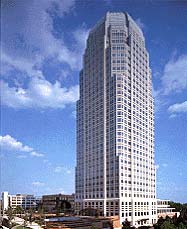 |
| Like its headquarters in Charlotte, N.C. (pictured), all of Wachovia’s 13 existing call centers are located in the U.S. Eastern Time Zone. |
Wachovia, Trendwest Bringing
700 New Jobs to Salem, Ore.
by JACK LYNE, Site Selection Executive Editor of Interactive Publishing
The fourth-largest U.S. bank is bringing the bigger of the two projects to the Beaver State. Wachovia is building a $20-million center in Salem, where it will employ 500 by early next year, bank officials said. And, they added, the Oregon operation may expand to 750 employees in the near future.
The new Salem project, however, means that the company will close two of its existing call centers. Wachovia announced that it will shut down both a 275-employee operation in Trap Falls, Conn., and a 100-employee facility in Wilmington, Del., in the spring of 2005.
Wachovia was specifically looking for a West Coast location for a new call center. Those site-search parameters were defined by a mismatch inside the company’s operations:
With assets of more than $410 billion, the bank has customers residing in all U.S. regions. That wasn’t aligning optimally with Wachovia’s 13 existing call centers. All are located in the U.S. Eastern Time Zone.
That discrepancy was affecting service. Customers, Wachovia research found, are most likely to call the bank’s centers during their lunch hours or shortly before or after dinner. But with its call operations concentrated along the eastern U.S., Wachovia was missing some of its customers’ prime service windows. Eastern Time-based customer reps were often on breaks when those prime-time periods were occurring in other U.S. time zones.
A West Coast center, though, would create an operation working on a time schedule that was three hours earlier. And that, the bank decided, would give the company stronger access to a broader range of customers’ lunch hours and dinnertimes.
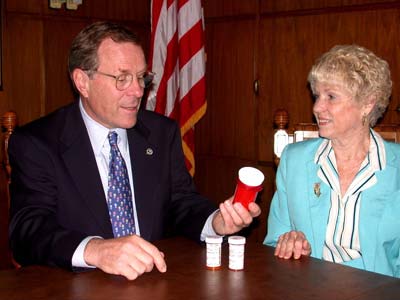 |
| Wachovia looked at more than 100 locations in the western U.S., according to Gov. Ted Kulongoski (pictured left while discussing prescription drug costs with AARP Oregon President Jane Sharp). |
In January, the Charlotte, N.C.-based company made its first contact with Oregon officials, who codenamed Wachovia’s expansion “Project Sail.” Aiming to steer Project Sail to Salem, the state offered the bank a $600,000 grant for employee training. In addition, Marion County offered another $251,000 for training at Salem-based Chemeketa Community College.
Wachovia officials, however, said that some other contending sites offered richer incentives. Ultimately, though, the bank decided that the Oregon city 47 miles (75 kilometers) south of Portland had the edge in work-force availability, they added.
Construction of the Salem new center actually began in late June, before the company’s name had been disclosed. State officials only later confirmed that Wachovia was overseeing the project.
Getting the facility up and running rapidly is essential in hitting the company’s aggressive hiring timetable. The bank said that it plans to hire 250 workers by the end of 2004, adding 250 more by the end of March 2005. About 50 current employees could possibly transfer to the Salem operation, bank officials added.
The new call center’s work force could well grow to 750 workers in the next few years, depending on factors that include further improvements in the national economy and a continuation of banking-industry consolidation. Wachovia in mid-June announced plans to acquire rival SouthTrust Corp. for $14.3 billion. If the deal closes by year’s end (as most analysts expect), Wachovia will surpass Bank of America as the largest retail bank in the U.S. Southeast.
Bank officials haven’t commented as to whether the Salem project means that the company may further disperse its call centers.
Call Center Action In-House
 |
| Trendwest has six resorts in Oregon, including the Gleneden Beach Resort (pictured) near Lincoln City. |
The world’s third largest timeshare resort company has been outsourcing its call center operations to third-party providers. Business growth, though, prompted Trendwest to bring part of that function back in-house.
“This is a very exciting milestone for our company,” explained Vice President of Marketing Operations Dianne Beard. “Our new office in Salem marks the first call center for Trendwest that will support all of our regional marketing efforts from one centralized location.”
Trendwest is a subsidiary of Cendant Corporation, a travel and real estate services company that includes Avis, Century 21, Coldwell Banker, Howard Johnson, Ramada and Days Inn. Headquartered in Redmond, Wash., the company operates 52 resorts in the United States, British Columbia, Mexico and Fiji under the WorldMark brand.
In Salem, Trendwest will be moving into leased space formerly occupied by another Cendant subsidiary, Fairfield Resorts. Fairfield opened its call center in 2002, but closed down a year and a half later. Company officials at the time blamed the shutdown on the advent of the National Do Not Call Registry (NDNCR).
Trendwest officials, however, say that their Salem call center won’t encounter similar problems. Operators will be calling the company’s existing clients, an authorized activity under NDNCR guidelines.
Salem positions Trendwest near some of its more popular resort destinations. The company has six resorts and three sales centers in Oregon employing 400 workers.
Adding 170 More Jobs, Relocating HQ
by JACK LYNE, Site Selection Executive Editor of Interactive Publishing
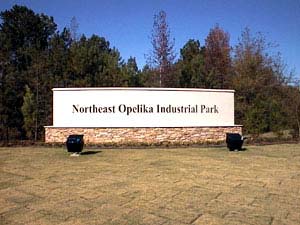 |
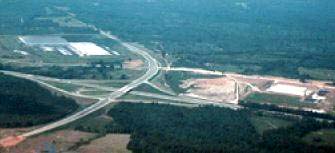 |
|
Mando’s expansion and its American headquarters
relocation are both occurring at the 1,900-acre (760-hectare)
Northeast Opelika Industrial Park (pictured left), a joint
venture between Opelika, Lee County and the Central Alabama
Electric Cooperative.
|
Hyundai supplier Mando America Corporation announced on July 11th that it’s undertaking a $35-million expansion in Opelika, Ala. And that decision comes only a few weeks after Mando America had just completed its initial facility in the Alabama city — a $30-million project that also happens to be the first North American plant for Korean firm Mando Corporation.
On top of that, the Kunpo, South Korea-headquartered parent concurrently announced that it’s relocating its small American corporate headquarters to Opelika from Detroit.
The twin decisions come only some 15 months after Mando America first chose Opelika for a 150-employee, 145,000-sq.-ft. (13,050-sq.-m.) facility. The company’s slam-bang second expansion will add 170 more jobs and 175,000 (15,750 sq. m.) of additional space at the just-completed facility, Mando America President Gi-On Jeon explained at the project announcement in Opelika.
Gov. Bob Riley (R) hailed the double-barreled expansion as an affirmation of the rapid rise of the state’s auto industry.
“Alabamians can take pride in the fact that Mando America is expanding its operations and relocating their North American headquarters to our state,” said Riley. “People are beginning to find out — literally all over the world — that if you want a quality product, a cost-effective efficient company, [or] a world-class product, you need to come to Alabama.”
Paying Off
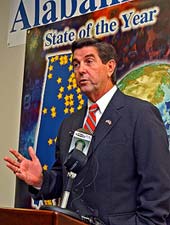 |
People are beginning
to find out that if you want a quality product, a cost-effective
efficient company, [or] a world-class product, you need
to come to Alabama,” said Gov. Bob Riley (pictured
speaking at a press conference earlier this year in Birmingham).
Photo: Kevin Glackmeyer, Governor’s Staff |
company leaders.”
One partnership in particular is paying off for Opelika: The Northeast Opelika Industrial Park, a joint venture between Opelika, Autauga County and the Central Alabama Electric Cooperative. Mando last year chose the Opelika site for its facility, which makes brake-corner modules, suspension modules and steering systems.
Mando America will also relocate its headquarters to the 42-acre (17-hectare) site that the company currently occupies in the Opelika development. (Mando, however, will continue to base its American R&D and sales and marketing operations in Detroit, company officials said.)
With its I-85 frontage and CSX rail service, the 1,900-acre (760-hectare) Northeast Opelika Industrial Park has already attracted a number of major tenants. Current occupants include Wal-Mart, which has an 880,000-sq.-ft. (79,200-sq.-m.), 700-employee distribution center, and Benteler Automotive Corp., which has a 144,000-sq.-ft. (12,960-sq.-m.), 150-employee plant. In addition, the Northeast Opelika Park was a major contender for the Hyundai plant that’s now under construction in Montgomery, as well as the Nissan plant that went to Canton, Miss., in late 2000.
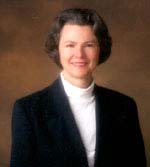 |
| Opelika Mayor Barbara Patton (pictured) called Mando America’s expansion “yet another example of this community’s efforts of to attract . . . world-class companies and to help those companies grow and expand.” |
(The city’s efforts last year won it a coveted spot in Site Selection’s Top 10 Development Groups for 2004, which are profiled in the May feature “On Solid Ground.”)
 headquarters
and its first plant on the continent. The Northeast Opelika Industrial
Park sits only 60 miles (96 kilometers) west of Montgomery, which
also lies on I-85. Mando’s Alabama operation will begin producing
parts for Hyundai’s huge Montgomery plant in February of 2005
headquarters
and its first plant on the continent. The Northeast Opelika Industrial
Park sits only 60 miles (96 kilometers) west of Montgomery, which
also lies on I-85. Mando’s Alabama operation will begin producing
parts for Hyundai’s huge Montgomery plant in February of 2005 Riley on July 11th had also announced another Alabama expansion: Movie Gallery, a home-video specialty retailer, is building a 190,000-sq.-ft. (17,100-sq.-m.), 74-employee distribution center on an 18-acre (seven-hectare) parcel in Westgate Industrial Park in Dothan. The center will distribute videos to Movie Gallery’s 2,300 video stores, which are based in the rural and secondary markets that the company has targeted.
Movie Gallery is based in Dothan. Nonetheless Chairman and CEO Joe Malugen said that the company’s site search included the entire Southeast. In the end, he explained, state and local recruiting efforts “reaffirmed that Alabama is the right place for Movie Gallery’s distribution center.”
 |
Stellar business recruiting efforts in Opelika (pictured) garnered the central Alabama city some 23,000 residents a coveted spot in Site Selection’s Top 10 Development Groups for 2004. |
| CONTINUE TO THE LATEST EDITION OF “TOP INCENTIVES DEAL” | |
| RETURN TO: SITESELECTION.COM
|
LOOKING FOR A PREVIOUS
STORY? CHECK THE ARCHIVE.
|
 PLEASE
VISIT OUR SPONSOR • CLICK ABOVE
PLEASE
VISIT OUR SPONSOR • CLICK ABOVE 
©2004 Conway Data, Inc. All
rights reserved. Data is from many sources and is not warranted
to be accurate or current.